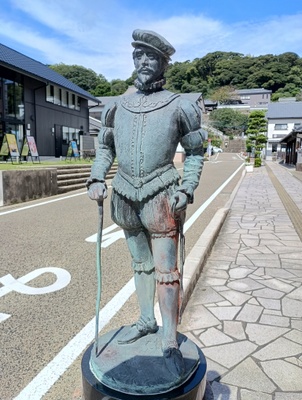Richard Cocks
Richard Cocks was the first head of the British East India Company (EIC) factory at Hirado.
Cocks was 47 years old when he arrived in Japan in 1613, aboard the Clove, alongside John Saris. Saris brought formal letters and numerous gifts from King James I, and with the help of William Adams (who had been in Japan since 1600 and was a close confidant to Ieyasu) obtained trading privileges for the Company. Saris and the Clove departed before the end of the year, and Cocks was left the head of a newly established Company factory in Hirado, with a staff of roughly one dozen men. Branch offices were established in Osaka, Kyoto, and Edo, and before long Cocks became relatively well-traveled within Japan, spending time in each of these cities and meeting with many of the most prominent officials in each.[1] Cocks also traveled overseas, visiting Ayutthaya (Siam) on at least one occasion.[2]
In 1614, he requested permission from the shogunate to establish formal EIC trade with the Ryûkyû Kingdom, but was rebuffed.
Cocks married a Japanese woman known only as Matinga.[3] She was from an elite background, and was perhaps the daughter of a retainer of Matsura Shigenobu, lord of Hirado han. In addition to presumably spending considerable time together, Cocks also set her up with a nice home of her own, and servants, and regularly sent gifts and so forth. On at least one occasion he received her father as a guest. Matinga helped out with Company business in a number of ways, chiefly as a tutor of Japanese language for the English staff. While the two were separated for a time, she continued to exchange correspondence; however, in 1621 Cocks discovered she had been having an affair with fellow EIC employee Richard Wickham, among others, and terminated their relationship.
Cocks is known to have sent gifts to the Japanese wives and children of William Adams, Jan Joosten, and a number of other prominent Dutchmen and Englishmen in Japan, and to have paid them visits; the documents seem to show a genuine fondness and personal relationship in many of these cases.
References
- Gary Leupp, Interracial Intimacy in Japan: Western Men and Japanese Women, 1543-1900, A&C Black (2003), 59-60.
- ↑ "Historical Overview." Four Hundredth Anniversary of Japan-British Relations. Accessed 23 January 2013.
- ↑ Cesare Polenghi, Samurai of Ayutthaya: Yamada Nagamasa, Japanese warrior and merchant in early seventeenth-century Siam. Bangkok: White Lotus Press (2009), 40-42.
- ↑ It is quite common in the European-language documents of the time for Japanese names to be sorely misrepresented. It is unclear what Japanese name - or even a European Christian name - "Matinga" might be derived from.
